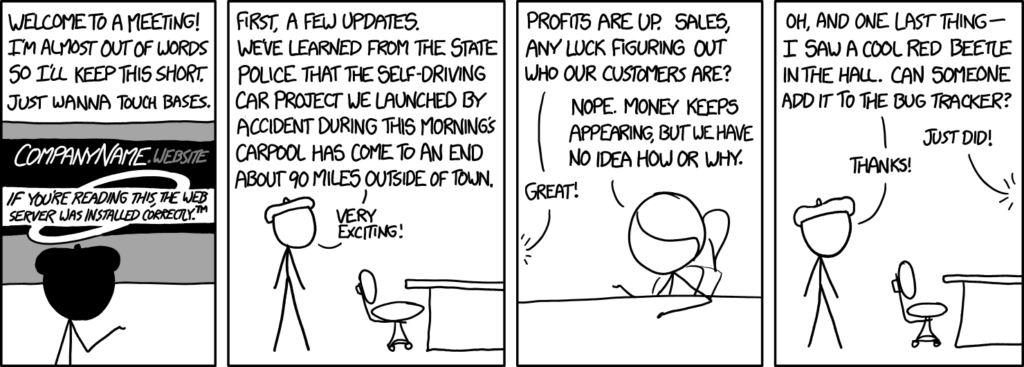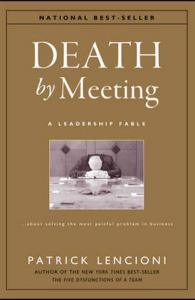So you finally made it! 12+ years of primary schooling plus high school and now you have managed to get through weeks, months, and years of school to be an Engineer. You can now put down that notebook. You have a job. This is the real world. You can Google any problem that you have. Stack Overflow is fully available for use. And you can finally put away that pen and paper because you don’t have to take down all of those infernal notes all the time!
You have a lot to learn, young grasshopper. After graduating the sheltered world of academia and you are now out in the brutal and unforgiving business world. You are now subject to deadlines, sales projections, and business whims. There are no office hours to beg for a better grade. The world you live in is defined by the PC in front of you, the 4 walls around you, and the relationships that you forge at the water cooler. And now you have to go to meetings.

Yes, no more tests. No more all-nighters studying. No more dragging yourself out of bed for 3 hours labs starting at 7:30… Instead you are now subject to the the greatest of entertainment events that humankind has to offer: business meetings! There are horror stories about meetings and for the most part they carry a very negative connotation. There is always some truth behind stories like this. There are many meetings that provide little value to some participants. However, if done right meetings can be entertaining and interesting and can provide a lot of value to the people in them. Conflicts and be hashed out, decisions can be made. Action items can be determined. Sexy, right?

In the book Death By Meeting: A Leadership Fable the author, Patrick Lencioni makes a bold claim. He has one of the characters, who happens to be teaching the value of meetings to her colleagues in a room, ask every participant whether they would rather go to see a movie or be in a meeting. Of course, everyone chooses a movie. Then the character goes on to state that properly run meetings provide something that a movie can’t: A properly run meeting provides not only the same drama, conflict, and intrigue that a well written movies provides, but it also gives every participant the ability to actively participate in that drama, conflict, and intrigue during the meeting. What fun!
No matter your feelings on meetings and settings aside the quality (or lack thereof) of the meetings that you attend at work, they all have one thing in common. If a meeting has any hope of providing value then notes are required. This is a bold statement. I am sure that you can come up with an example of a meeting that doesn’t fit this theory. How about:
We had a meeting to determine a simple yes or no in regards to making a new product. We all walked away in agreement that the answer is yes. Why would I need notes for this?
Or what about a statement like this:
We had a meeting to let someone go. The goal was to get in, communicate the decision, and get them out the door. We did this successfully. How would notes help this?
The counters to both of these are pretty easy to come up with. In the first example everyone as in agreement as to the direction and everyone went out and did their jobs and created the product. Then it flopped. After that, upper management wanted to do a review of the decision making process but due to the fact that no notes were taken during the meeting, the majority of reasons to agree on moving forward with the product were lost to the winds of time and now management needs a scapegoat. So the meeting originator was the unlucky sacrificial goat and a second meeting was held to communicate the decision by the company to part ways. Unfortunately for this company, since nobody in the meeting took notes of any kind and some inappropriate things were said the person being let go sued the company and ended up winning because no evidence existed to support the company’s claims.
Notes are a critical function to being successful in the business world. Now the question is, how do you take effective notes in meetings? There are two elements to this and both are important. The only exception that may occur to counteract one of these arguments would be if you are not a direct active participant in the meeting. It may be that you are the dedicated note-taker and are responsible for taking notes for everyone. There may be other scenarios that don’t fit, but for this example let’s assume that you are a contributing party to this meeting.
Element #1 To Note Taking In A Meeting: Make Eye Contact
I have had the great pleasure to build and manage an internship program in conjunction with a local university. This program provides students with entire semesters dedicated to working for local companies as interns for exposure and experience purposes. A few years ago while sitting down to talk to an intern on their first rotation with the company, I was leading a meeting with an intern and another teammate to go over the program and some project expectations. With the three of us in a room and some previous excitement about the project, there was an expectation for some lively conversation and discussion. The meeting was awful. It ended up being the two of us talking at a hunched over intern while they furiously typed away on their…. cellphone. It ended up feeling like more of a lecture from us while being punctuated by the clickkity-clickkity-click of a tiny keyboard.
If you are just out of school and new to the business world or if you just went through bootcamp and are now in your first professional development gig please heed the following: Meetings don’t work if they aren’t interactive. Remember the question about attending a meeting versus watching a movie? Or maybe a better example would be attending a lecture? If you aren’t there to participate and interact with people then why be there at all? Someone could just send you an email with the notes already typed. That would be easier and more efficient for everyone involved.

Meetings require eye contact and participation. Looks, listen, discuss, and then write. Don’t miss out on the opportunities that meetings provide. Where else are you going to get to add your ideas to the mix and be a thought leader? The more you speak up and add your voice to meetings the more that you will be a part of steering your ship in a positive direction with you playing a role in that guidance. If you are starting at your phone or your paper then you will miss the involuntary reactions when someone proposes a great or horrible idea. You can’t catch someone’s eye and raise an eyebrow to gauge their level of acceptance to the idea being presented. Eye contact is key here, both when you are speaking and when you are listening.
Element #2 To Note Taking In A Meeting: Cover Your Butt
There are many ways to be an effective teammate and to provide value to your superiors. One of the best ways that I have found to show your value is to follow a methodology of writing down all action items and minor requests that come my way no matter where or when they come up and to try and anticipate my boss’s needs and wants and to get their first. Taking notes in meetings are absolutely crucial to this effort. I follow a philosophy of trying to make my boss look good by providing them the information they need before they know that they need it. Therefore, when taking notes in a meeting it is with a focus on the action items that I need to complete. These can be big items, they can be small, minor questions. No matter how big or small, it is my goal to always provide answers to any inquiry that comes my way. Pairing this collection of action items along with the general notes that I take with relevant data and information provides a solid method for effective note taking in meetings.
What is the hands-down best way to take these notes? Skip the computer. Grab a pen or pencil and some paper. Notebooks work great as well. While technology is great, when you are typing on a laptop it is way too easy for people to question whether you are paying attention to the ongoing meeting, writing an email about that support item, or playing a game of tetris. In an article about how science supports the pen and paper method over technology ( Want to Take Better Notes? Ditch the Laptop for a Pen and Paper, Says Science by James Sudakow ) the author talks about how studies have shown that students who take handwritten notes remember far more information after lectures than the ones on a laptop. This methodology even extended to better recollection when reviewing those notes after the fact. If you don’t believe me, start taking a few minutes in meetings that you attend to try and observe the people that are taking notes and compare them with the rock stars and high performers at your company. Who from this group is sitting there taking notes and who is sitting there surfing the web in meetings? It is not a coincidence that in most cases these groups will along the same lines as the handwritten note takers versus the typers and non-note takers.

So now you have your pen, your paper, and you find yourself in a meeting. What should you write down? Simple: write down anything that is even close to an action item that you might be responsible for and write down any data that someone might ask you later. Yes, I am suggesting that you use the principle of CYA to determine whether a note is useful to jot down or not. This goes back to the philosophy that I need to provide those around me with the information that they need before they know that they need it. I also want to complete tasks before they are even officially assigned to me. It is possible in a lot of cases to get there first by taking down solid notes and action items that fall anywhere even remotely close to my area of responsibility and expertise.
Remember, you aren’t in school anymore Dorothy… While there aren’t really any flying monkeys and you can’t drop a house on someone no matter how annoying they are in the next cubicle, things are different in the big, wide business world. However, by finding your voice and figuring out how to take the notes that provide a path to your success, you can choose to be the star of your own meeting. Thanks for reading!


Comments are closed, but trackbacks and pingbacks are open.